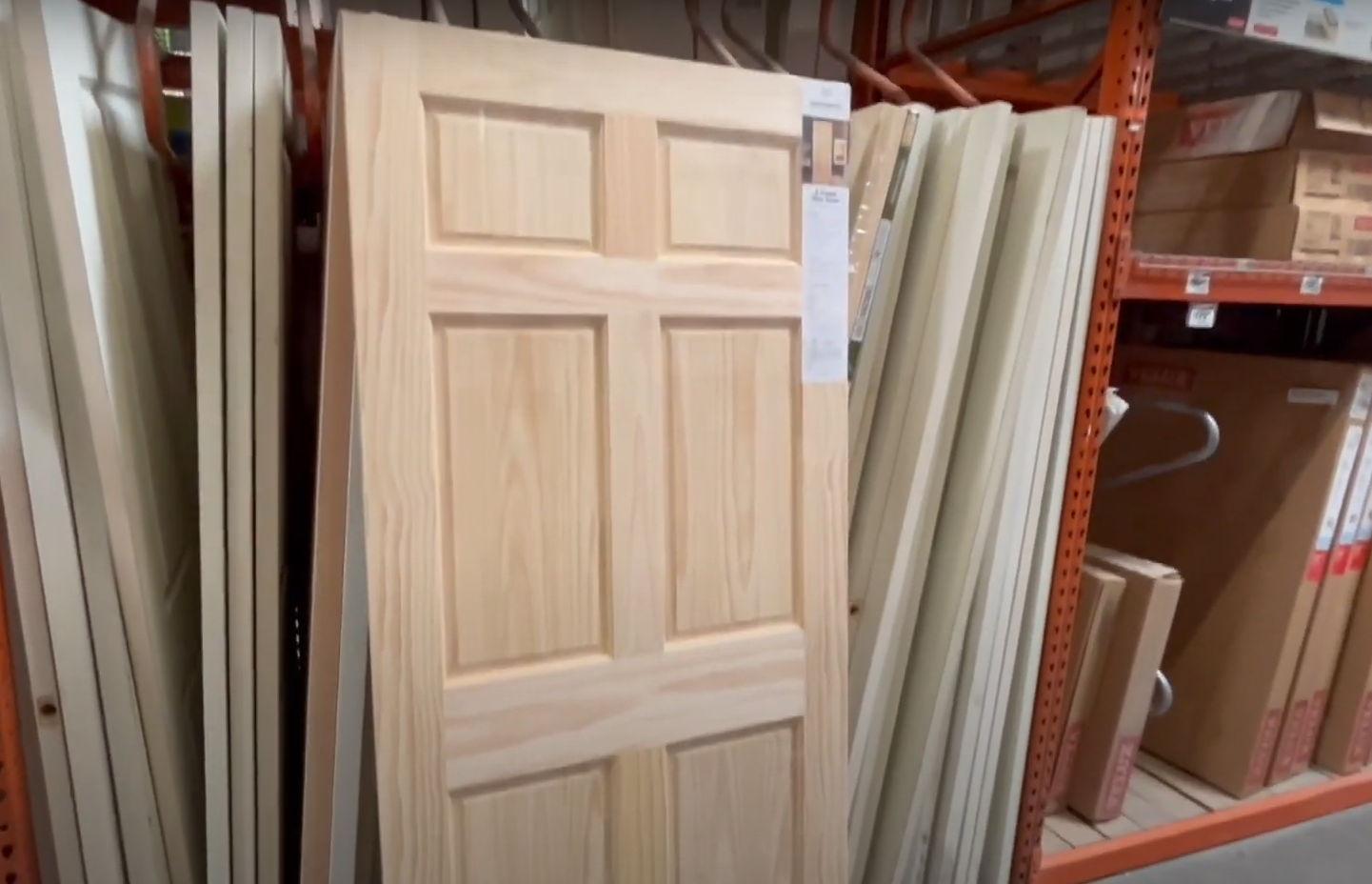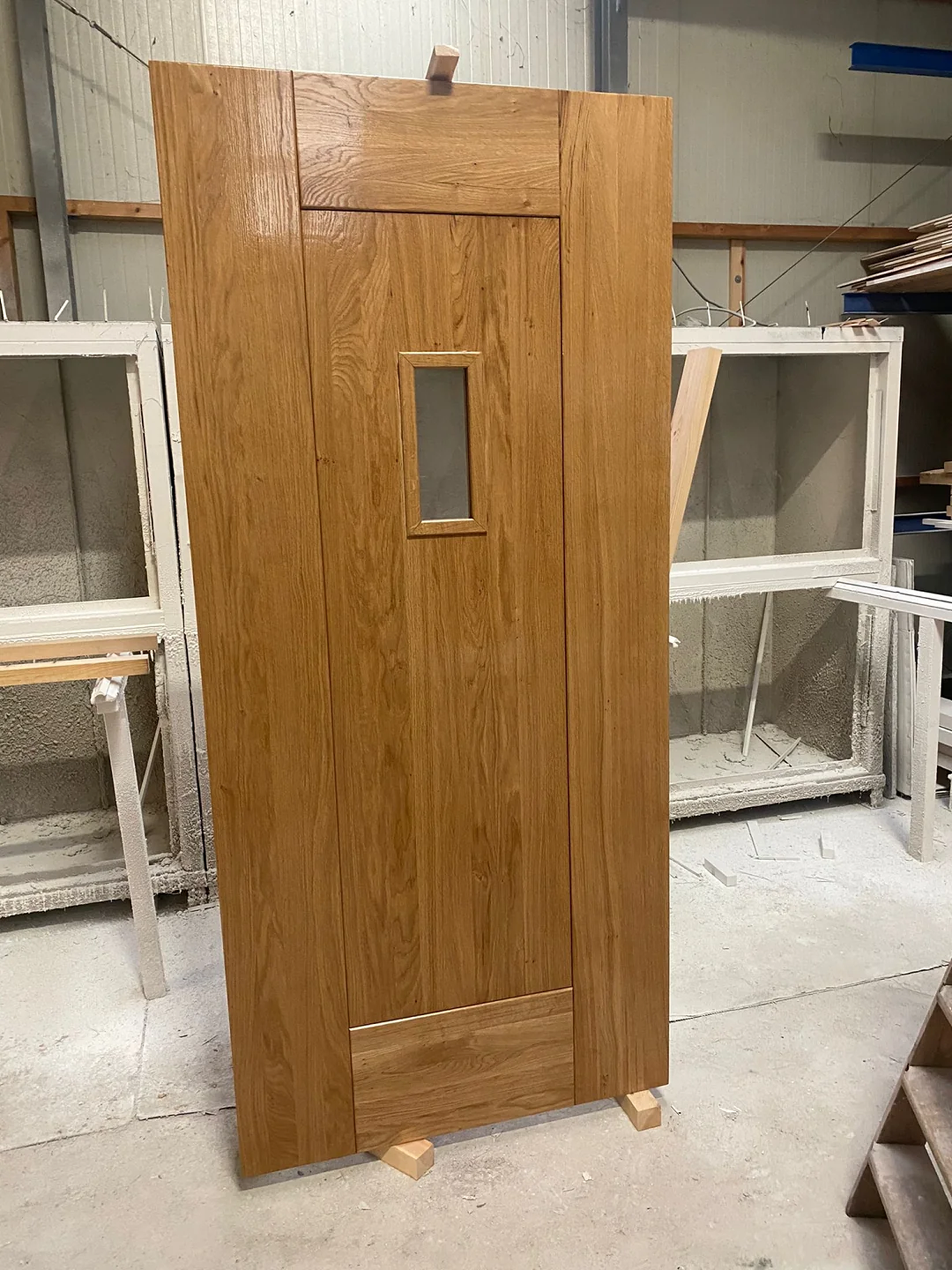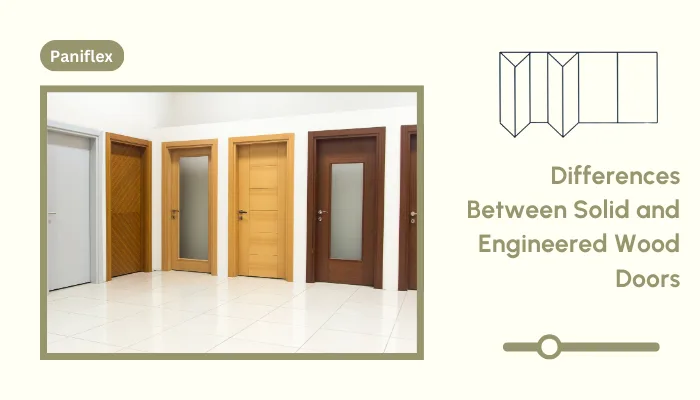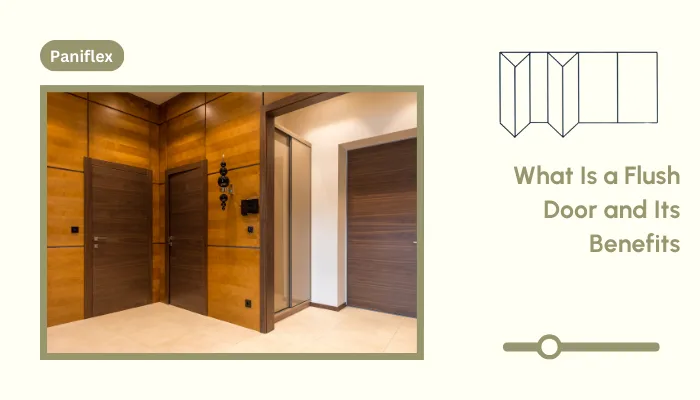When it comes to choosing interior or exterior doors, wood remains one of the most popular materials for its timeless beauty and versatility. But deciding between solid wood and engineered wood doors is not always straightforward. Each type offers distinct advantages in durability, performance, and cost, making it essential to understand their differences before specifying or installing them.
We understand how challenging it can be to balance design goals with practical considerations, such as budget, climate, and maintenance. This guide breaks down the characteristics, applications, and key factors to help you make an informed choice that aligns with your project’s needs.
Ready to experience the benefits of custom closet doors? Explore our range of Paniflex products now.
In a nutshell:
- Solid wood and engineered wood doors differ in construction, durability, cost, and moisture resistance.
- Knowing these differences helps you specify the right door for performance, budget, and design needs.
- Solid wood suits luxury and heritage spaces; engineered wood works well in high-traffic or humid areas.
- Custom fabrication ensures the chosen door type fits perfectly and performs reliably over time.
What Are Solid Wood Doors?
Solid wood doors are constructed entirely from natural timber, offering a traditional look and substantial feel that many consider the hallmark of quality. These doors are crafted from a single species of wood or multiple boards joined together to form a robust structure.
Characteristics of solid wood doors:
- Made entirely from natural lumber such as oak, mahogany, or maple.
- Known for their weight, density, and premium tactile experience.
- Excellent thermal and acoustic insulation due to solid construction.
- Can be sanded and refinished multiple times over their lifespan.
- Prone to warping or swelling in high humidity if not correctly sealed.
While solid wood doors offer unmatched authenticity, engineered wood doors provide a modern alternative designed to overcome some of the limitations of natural timber. Let us explore how their construction differs and where they excel.
What Are Engineered Wood Doors?
Engineered wood doors are built using a layered core of composite materials like MDF or HDF, topped with a veneer or laminate that gives the appearance of solid wood. This construction method enhances stability and reduces susceptibility to environmental changes.
Characteristics of engineered wood doors:
- Core made from high-density fiberboard, particleboard, or a solid engineered timber block.
- Outer layer finished with natural wood veneer, laminate, or painted surface.
- Resistant to warping, cracking, and moisture damage compared to solid wood.
- Lighter in weight, making installation easier and hardware requirements less demanding.
- More cost-effective while offering a wide range of design options.
With both types defined, the next step is to see how they measure up across key factors like durability, cost, style, and performance. A side-by-side comparison will help clarify which is better suited for your project.
Suggested Read: Installing Sliding Closet Doors Over Carpet
Solid vs. Engineered Wood Doors – A Detailed Comparison
Understanding the strengths and limitations of each door type is crucial for making an informed choice. This comparison highlights how solid and engineered wood doors perform across critical factors.
Quick comparison table:
| Feature | Solid Wood | Engineered Wood |
|---|---|---|
| Durability | Highly durable | Stable, less prone |
| Cost | More expensive | Cost-effective |
| Weight | Heavy | Lightweight |
| Moisture Resistance | Less resistant | More resistant |
| Maintenance | Higher upkeep | Low maintenance |
| Design Options | Natural variations | Wide range of finishes |
| Acoustic Insulation | Superior soundproofing | Moderate soundproofing |
These differences are explained in greater detail below:
1. Durability
When it comes to longevity and strength, both solid and engineered wood doors offer distinct advantages based on their construction. This is:
- Solid Wood: Solid wood doors are incredibly robust and can last for many years, offering a timeless appeal. However, they are susceptible to changes in humidity and temperature, which may cause the wood to expand, contract, or even crack, especially in areas with fluctuating climates.
- Engineered Wood: Engineered wood is built for stability and has been designed to withstand moisture and temperature changes better than solid wood. Its layered construction minimizes the risk of warping or cracking over time, making it an excellent option for environments with high humidity or fluctuating temperatures.
2. Cost
The price difference between solid and engineered wood doors is significant and can affect your budget planning. Key differences include:
- Solid Wood: Due to the material’s natural origins and the craftsmanship required, solid wood doors come at a higher cost. The quality of the wood, especially in premium types like oak or walnut, also adds to the overall price.
- Engineered Wood: Engineered wood doors are much more affordable due to their mass production and the use of composite materials. Although they may not offer the same natural charm as solid wood, they still provide a premium look and feel at a lower price point.
3. Weight
The weight of the door can have a big impact on installation and hardware requirements. This is explained below:
- Solid Wood: Solid wood doors are much heavier, which can make them more difficult to handle during installation. They require stronger frames and hinges to support their weight, which may increase installation costs and time.
- Engineered Wood: Engineered wood doors are significantly lighter than their solid wood counterparts. This makes them easier to install and reduces the strain on the door hardware, allowing for quicker, simpler installation with less demanding structural support.
4. Moisture Resistance
One of the key considerations when choosing between solid and engineered wood doors is how well they perform in moisture-rich environments. The primary difference is:
- Solid Wood: While solid wood doors offer a premium look, they are more vulnerable to moisture. In areas like bathrooms or kitchens, solid wood doors can swell, warp, or crack if not properly sealed and maintained.
- Engineered Wood: Engineered wood is more moisture-resistant due to its layered design, which helps prevent expansion and contraction. Its ability to handle humidity makes it a better option for areas with fluctuating moisture levels, such as kitchens, bathrooms, or basements.
5. Maintenance
The level of care required for each door type is important to keep in mind, especially for long-term usability. The key differences in maintenance are:
- Solid Wood: Solid wood requires more maintenance to preserve its appearance and durability. It needs periodic refinishing, especially in high-traffic areas, and may require resealing to protect against moisture damage. Regular inspections for cracks or warping are also necessary.
- Engineered Wood: Engineered wood doors are much easier to maintain. They retain their appearance longer with minimal effort and do not require frequent refinishing. Their durable surface resists scratches and dents, making them ideal for spaces that experience regular use.
6. Design Options
The design flexibility of both solid and engineered wood doors can play a large role in achieving your desired look. Differences in design options are:
- Solid Wood: Solid wood doors offer the benefit of unique, natural grain patterns that give each door a one-of-a-kind appearance. They can be custom-crafted to suit specific design needs, making them ideal for high-end, bespoke designs.
- Engineered Wood: Engineered wood provides a more consistent appearance, with less variation in grain patterns. It can mimic the look of different wood species, making it a versatile option for various design styles, without the unique natural imperfections of solid wood.
7. Acoustic Insulation
When noise reduction is a priority, the material of the door plays a critical role in acoustic performance. The differences can be understood as:
- Solid Wood: Solid wood doors are excellent for soundproofing due to their density and thickness, which absorb sound waves effectively. This makes them ideal for spaces that need noise isolation, such as home theaters, offices, or bedrooms.
- Engineered Wood: Engineered wood offers moderate sound insulation, but due to its layered construction, it may not provide the same level of soundproofing as solid wood. In areas where acoustic performance is crucial, additional treatments may be needed, such as acoustic panels or weatherstripping.
Knowing the differences is just the first step. To make the right selection for your project, it is equally important to evaluate how these factors align with your specific needs and constraints.
Factors to Consider When Choosing Between Solid and Engineered Wood

Selecting the right door involves more than comparing materials. It requires a clear understanding of your project’s priorities and limitations.
These key factors can guide your decision toward the best fit for both function and appearance:
- Budget Constraints: Solid wood offers premium quality at a higher price, while engineered wood is more cost-effective for large-scale projects.
- Climate Conditions: Humidity and temperature fluctuations may favor engineered wood’s stability over solid wood’s natural tendencies.
- Usage Frequency: High-traffic areas benefit from engineered wood’s durability, whereas solid wood suits spaces where visual impact is paramount.
- Design Requirements: Solid wood provides rich, natural grains; engineered wood offers a consistent look with diverse finishes.
- Installation Considerations: Engineered wood’s lighter weight can simplify handling and reduce hardware strain.
Suggested Watch: Look at this video to learn how to choose a solid wood door or a solid core (engineered) door.
Applications of Solid and Engineered Wood Doors
Both solid and engineered wood doors bring unique strengths to different types of projects. Understanding where each performs best helps ensure you choose the right door for the function, style, and budget of the space.
These are a few ways solid and engineered wood can be applied to different spaces:
1. Residential Applications
Both solid and engineered wood offer unique advantages depending on the style and requirements of the residential space:
- Solid Wood: Perfect for luxury homes, heritage restorations, and spaces requiring high-end finishes that showcase natural beauty and craftsmanship.
- Engineered Wood: An affordable option for apartments, interior room doors, and modern layouts, offering durability and design flexibility at a lower cost.
2. Commercial Applications
The versatility of solid and engineered wood doors can be tailored to various commercial environments:
- Engineered Wood: Excellent for high-traffic areas like offices, hotels, and retail spaces, where cost-effectiveness and durability are essential without compromising on style.
- Solid Wood: Ideal for executive offices or spaces that emphasize premium design and a high-quality, sophisticated atmosphere.
3. Specialty Spaces
Each material shines in specific spaces where performance is paramount. For instance,
- Solid Wood: An excellent choice for acoustic doors in home theaters or recording studios, where sound insulation and density are critical for optimal performance.
- Engineered Wood: Perfect for fire-rated or moisture-resistant doors in kitchens and bathrooms, offering stability and safety where environmental factors are a concern.
While understanding where each door type excels is essential, misconceptions about engineered wood doors often lead to hesitation or missed opportunities.
Clearing up these myths is necessary for contractors, architects, and interior designers to make confident, informed choices for their projects.
Common Misconceptions About Engineered Wood Doors

Engineered wood doors have undergone significant improvements in quality and design, yet some outdated perceptions persist. Addressing these misconceptions can help design professionals and contractors make informed recommendations without hesitation.
Myth 1: Engineered Wood Doors Are Cheap And Inferior
This perception stems from early-generation products. Modern engineered wood doors use advanced cores and high-quality veneers or laminates, offering excellent performance and looks. Many even meet fire, acoustic, and environmental certifications comparable to solid wood.
Myth 2: They Cannot Match The Beauty Of Solid Wood
High-end veneers and finishing techniques now allow engineered doors to replicate the look and texture of natural wood convincingly. These doors also provide a level of consistency that solid wood cannot guarantee due to natural variations.
Myth 3: Engineered Doors Are Not Durable
Contrary to this belief, engineered wood doors resist warping, swelling, and cracking far better than solid wood in fluctuating climates. Their layered construction enhances stability, making them ideal for high-traffic and humid environments.
Clarifying these misconceptions highlights why engineered wood doors deserve serious consideration. Next, let us look at how solid and engineered wood compare in terms of long-term value and overall project investment.
Suggested Read: Simple Steps to Install a Door in a Hallway
Cost vs. Value – Making the Right Investment
When selecting between solid and engineered wood doors, it is crucial to balance upfront costs with long-term performance. Understanding the value each type offers helps you make a decision that aligns with both budget and project goals.
These are a few factors you should consider to make an effective decision:
- Initial Cost: Solid wood doors are more expensive due to material and craftsmanship; engineered wood is more affordable, especially for large projects.
- Long-term Durability: Solid wood may need refinishing and repairs, while engineered wood resists environmental damage, lowering maintenance costs.
- Design Flexibility: Engineered wood offers a broader range of finishes and sizes at a lower cost, providing high value without premium pricing.
- Resale Value: Solid wood doors often appeal to buyers in luxury markets; engineered wood suits cost-sensitive projects with good functional performance.
Cost and value considerations set the foundation, but custom fabrication takes the quality and fit of any door, whether solid or engineered, to the next level.
From the Community: Read this thread to identify a solid core door vs a solid wood door
Importance of Custom Fabrication in Door Selection
Whether you choose solid or engineered wood, precision fabrication ensures doors meet the exact specifications of your project. Custom fabrication enhances fit, function, and style, making it a critical consideration for high-quality results.
These are a few reasons to choose custom fabricated doors:
- Perfect Fit: Handles non-standard sizes and architectural complexities with ease.
- Enhanced Durability: Precision in joints and materials increases lifespan and reduces failures over time.
- Design Flexibility: Allows for bespoke finishes, panel configurations, and hardware integrations.
- Improved Performance: Ensures better thermal, acoustic, and structural properties tailored to the space.
For projects that demand both precision and design appeal, working with an experienced fabricator is key. Here is how Custom Door & Mirror brings that expertise to every project.
Suggested Read: DIY Ideas for Replacing HVAC and AC Closet Doors
Choose Custom Door & Mirror for Your Needs
For projects demanding precision, durability, and tailored solutions, Custom Door & Mirror offers the expertise and craftsmanship to deliver doors that meet the highest standards. Our approach ensures seamless integration into diverse architectural and design requirements.
These are a few reasons to choose our custom solutions:
1. Decades of Industry Experience
With 36 years of experience working on complex residential and commercial projects, we understand the challenges professionals face and provide doors that perform flawlessly under demanding conditions.
2. Expertise in Custom Fabrication
Our team excels at handling unique specifications, non-standard sizes, and intricate designs that other manufacturers may struggle with. This expertise allows us to be a trusted partner for contractors, architects, and interior designers, providing custom solutions that meet every need, no matter how complex.
3. Premium Materials and Finishes
We source only the highest quality materials, from sustainably sourced woods to premium hardware, and offer a wide range of finishes to suit every aesthetic. Whether your project requires a classic wood grain or a modern matte finish, we ensure that every door aligns with your project’s design and functional goals.
4. Integration with Project Timelines
We know that timelines are crucial in the construction and renovation industry. By providing reliable lead times and ensuring efficient delivery, we ensure that your doors are delivered and installed on schedule. We make sure that you install doors without disrupting critical project phases, keeping your project running smoothly.
5. Collaboration Across Disciplines
Our team works closely with you to address site-specific challenges and ensure that every door meets both structural and aesthetic requirements. Whether it’s adjusting to a particular architectural feature or aligning with a unique design vision, we provide precision and flexibility to bring your project to life.
Custom Door & Mirror is more than a supplier. We are a partner in achieving superior outcomes. Our attention to detail and commitment to quality make us an excellent choice for projects requiring doors built to exacting standards.
Ready to experience the benefits of custom closet doors? Explore our range of Paniflex products now.
Conclusion
Choosing between solid and engineered wood doors requires careful consideration of performance, cost, and design goals. From durability and looks to ease of installation, understanding these differences helps you specify doors with confidence.
Custom Door & Mirror brings decades of expertise in fabricating precision-engineered doors tailored to your needs. Whether you are working on a residential renovation or a large-scale commercial project, our ability to deliver exceptional quality and customized solutions ensures doors that perform beautifully for years to come.
Contact us today to discuss your project requirements and discover how our custom fabrication services can improve your design.
Frequently Asked Questions
1. Is an engineered wood door better than a solid wood door?
It depends on the application. Engineered wood doors are more stable in humid environments and cost-effective, while solid wood offers unmatched natural beauty and longevity. Each has advantages based on climate, budget, and design requirements.
2. What is better, engineered wood or solid wood?
Neither is universally better. Solid wood provides a premium look and durability, but requires more maintenance. Engineered wood offers consistent quality, better moisture resistance, and affordability, making it ideal for high-traffic areas or projects with tight budgets.
3. What is the disadvantage of a solid core door?
Solid core doors, though excellent for soundproofing and durability, are heavy and harder to install. They may also require stronger hardware and are less resistant to moisture damage compared to fully engineered options with protective layers.
4. Do solid core doors really make a difference?
Yes, solid core doors provide superior acoustic insulation, a more substantial feel, and improved durability over hollow core doors. They are ideal for bedrooms, offices, and any area where privacy, noise control, and a quality finish are priorities.






